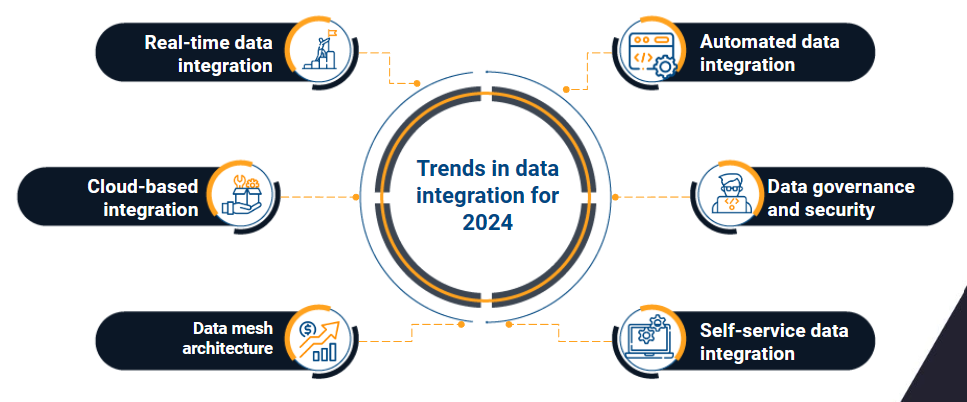Within a company, different types of data are managed, these are often lost because there is no person or system waiting to unify them in one place so that they can access them. Essentially, this is what data integration is all about.
In the documentation provided by Google Cloud they explain “Data integration is the process of discovering, moving, and combining data from multiple sources to generate insights and power machine learning and advanced analytics.”
Trends in data integration for 2024
Although it is not easy to predict where the technology market is going to move, there are some trends in data integration that could be positioned as the most requested and most beneficial for companies:
Real-time data integration
Companies increasingly demand more information in real time. Future data integration solutions may focus on providing real-time or near real-time data integration capabilities to enable faster decision making.
Cloud-based integration
Cloud computing remains a dominant force. Data integration solutions are likely to become more cloud-centric and take advantage of the scalability, flexibility, and cost-effectiveness of cloud platforms.
Data mesh architecture
The concept of "data mesh" has gained traction. This approach involves decentralizing data ownership and architecture, treating it as a commodity, and allowing cross-functional teams to manage their data domains.

Automated data integration
Automation is a key trend in technology. Future data integration tools may incorporate more automation, using machine learning and artificial intelligence to handle tasks such as data mapping, schema comparison, and error resolution.
Data governance and security
With growing concerns over data privacy and regulations, data governance and security will continue to be critical. Future data integration solutions are likely to include robust features to ensure data quality, compliance, and security.
Self-service data integration
Training non-technical users to perform data integration tasks is increasingly important. Future solutions may focus on providing self-service capabilities, allowing business users to integrate and analyze data without heavy reliance on IT.

API-based integration
Application programming interfaces (APIs) play a crucial role in modern software development. Data integration may increasingly rely on API-based approaches to connect and exchange data between different systems.
Data virtualization
Data virtualization allows users to access and manipulate data without requiring a physical copy. Future data integration solutions can leverage data virtualization to provide a unified view of data from disparate sources.
Graph Database Integration
Graph databases excel at handling complex relationships between data entities. Integrating graph databases into data integration processes can improve the representation and analysis of interconnected data.

Blockchain for data integrity
Blockchain technology can be used to ensure data integrity and traceability. In the future, we may see data integration solutions that incorporate blockchain to provide secure, tamper-proof data records.
Serverless integration
Serverless computing allows developers to focus on the code without managing the underlying infrastructure. Future data integration solutions could leverage serverless architectures to improve scalability and reduce operational overhead.
At Rootstack we have a team of developers who are experts in data integration, using technologies like MuleSoft to organize and analyze a company's data to generate multiple benefits. Do not hesitate to contact us.
We recommend you on video


